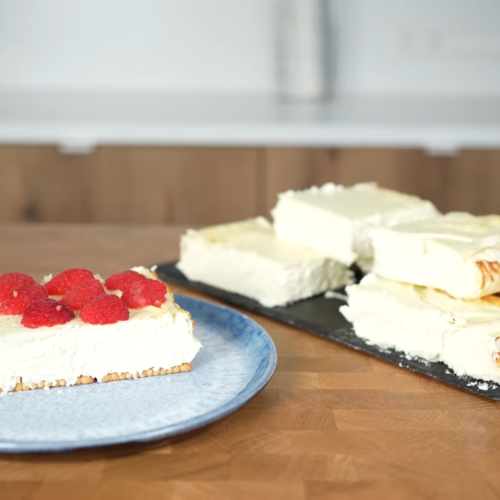<p
”
32″>Eating
sweets
from
time
to
time
doesn’t
have
to
mess
with
training
progress
or
fitness
goals.
Completely
cutting
out
desserts
makes
sticking
to
a
diet
harder,
and
eventually,
cravings
win.
A
high-protein,
low-calorie
cheesecake
solves
that
problem—giving
the
same
rich,
creamy
texture
without
packing
on
unnecessary
sugar
and
fat.
Protein
helps
with
muscle
recovery
and
keeps
hunger
in
check,
so
there’s
no
reason
to
rely
on
junk
when
a
better
option
exists.
Whether
it’s
a
post-workout
snack,
a
late-night
bite,
or
something
to
keep
the
diet
from
feeling
restrictive,
this
cheesecake
fits.
No
guilt,
no
setbacks—just
a
smart
way
to
enjoy
food
without
it
getting
in
the
way.

High-Protein
Fitness
Cheesecake
This
high-protein
cheesecake
is
a
creamy,
guilt-free
dessert
packed
with
protein
while
staying
low
in
carbs
and
fat.
It’s
the
perfect
post-workout
treat
or
a
healthy
dessert
option
for
anyone
watching
their
macros.
Enjoy
it
plain,
or
customize
it
with
different
flavors
and
toppings!
-
1
½
cups
(340g)
fat-free
Greek
yogurt -
8
oz
(225g)
fat-free
cream
cheese
(room
temperature) -
2
scoops
(60g)
vanilla
or
unflavored
whey
protein
powder -
¼
cup
(50g)
granulated
sweetener
egg
(erythritol,
stevia,
or
monk
fruit) -
1
large
egg -
1
tsp
vanilla
extract -
1
tbsp
cornstarch
(or
almond
flour
for
a
low-carb
option) -
Pinch
of
salt -
2
tbsp
unsweetened
almond
milk
(if
needed
for
consistency)
-
Preheat
&
Prep:Preheat
the
oven
to
325°F
(163°C).
Lightly
grease
a
7-inch
springform
pan
or
line
it
with
parchment
paper. -
Mix
Wet
Ingredients:In
a
mixing
bowl,
beat
together
Greek
yogurt,
cream
cheese,
and
sweetener
until
smooth. -
Add
Dry
Ingredients:Add
the
protein
powder,
cornstarch,
vanilla
extract,
and
salt.
Mix
until
fully
combined. -
Incorporate
Egg:Crack
in
the
egg
and
mix
gently
until
just
incorporated
(don’t
overmix).
If
the
batter
is
too
thick,
stir
in
almond
milk. -
Bake:Pour
the
mixture
into
the
prepared
pan
and
smooth
out
the
top.
Bake
for
30-35
minutes,
or
until
the
edges
are
set
but
the
center
still
jiggles
slightly. -
Cool
Gradually:Turn
off
the
oven
and
let
the
cheesecake
cool
inside
for
10
minutes
with
the
door
slightly
open.Remove
from
the
oven,
cool
at
room
temperature,
then
refrigerate
for
at
least
4
hours
before
slicing.
Use
casein
protein
instead
of
whey
for
a
creamier
texture.
If
cracks
form,
don’t
worry—just
top
with
Greek
yogurt
or
fruit
for
a
smooth
look.
Add
cinnamon,
cocoa
powder,
or
lemon
zest
for
extra
flavor
variations.
Chill
overnight
for
the
best
texture
and
consistency.
Nutritional
Information
(Per
Serving)
-
Calories:
~140 -
Protein:
~15g -
Carbs:
~6g -
Fat:
~3g
<h2
”
1″>How
to
Customize
the
Cheesecake
No
reason
to
keep
it
the
same
every
time.
A
few
small
changes
make
it
taste
completely
different
while
keeping
the
nutrition
in
check.
For
a
chocolate
version,
mix
in
2
tablespoons
of
unsweetened
cocoa
powder
and
switch
vanilla
protein
for
chocolate
protein
powder.
Adding
a
little
extra
sweetener
helps
balance
out
the
bitterness.
A
lemon
variation
is
just
as
easy.
Grate
the
peel
of
one
lemon
into
the
batter,
and
swap
vanilla
extract
for
almond
or
lemon
extract.
The
citrus
cuts
through
the
richness
and
makes
it
feel
lighter.
Cinnamon,
nutmeg,
or
pumpkin
spice
turn
it
into
something
closer
to
a
fall
dessert.
A
teaspoon
is
enough
to
make
a
difference
without
overpowering
everything
else.
Toppings
change
the
whole
thing.
Greek
yogurt
mixed
with
a
little
sweetener
works
as
a
high-protein
frosting.
Fresh
berries,
crushed
nuts,
or
a
drizzle
of
sugar-free
syrup
all
add
something
extra
without
wrecking
the
macros.
Alternative
Ingredients
for
Different
Diets
Some
ingredients
don’t
work
for
everyone,
but
that
doesn’t
mean
the
cheesecake
is
off-limits.
A
few
swaps
keep
everything
in
balance
while
making
it
fit
different
diets.
-
Low-Carb
/
Keto:
Instead
of
cornstarch,
use
almond
flour
or
just
leave
it
out.
Stick
to
a
low-carb
sweetener
like
monk
fruit
or
stevia. -
Dairy-Free:
Greek
yogurt
and
cream
cheese
can
be
swapped
for
dairy-free
alternatives
made
from
almonds
or
cashews.
Keep
in
mind
the
texture
might
change
slightly. -
Egg-Free:
The
egg
helps
with
structure,
but
replacing
it
with
1
tablespoon
of
cornstarch
and
2
tablespoons
of
almond
milk
keeps
it
together
without
an
issue.
<h2
”
9″>You
Can
Also
Try
a
High-Protein
Crust
for
Texture
A
crust
isn’t
necessary,
but
it
adds
something
extra
without
messing
up
the
macros.
Most
regular
cheesecake
crusts
are
loaded
with
butter
and
sugar,
but
a
few
simple
swaps
keep
it
high
in
protein
and
low
in
unnecessary
calories.
Mix
½
cup
almond
flour,
1
scoop
vanilla
or
unflavored
protein
powder,
and
1
tablespoon
melted
coconut
oil
or
unsweetened
applesauce.
Press
it
into
the
bottom
of
the
pan
before
adding
the
cheesecake
mixture.
Bake
for
5-7
minutes
at
325°F
(163°C)
until
slightly
firm,
then
pour
the
filling
on
top
and
bake
as
usual.
FAQs
<h2
”
1″>Bottom
Line
A
high-protein,
low-calorie
cheesecake
makes
it
easy
to
enjoy
something
sweet
without
wrecking
progress.
Simple
ingredients
keep
it
light,
while
protein
helps
with
muscle
recovery
and
satiety.
Customizing
flavors,
adjusting
ingredients
for
different
diets,
and
preventing
common
mistakes
ensure
the
best
results
every
time.
No
need
to
cut
out
desserts—just
make
them
work.
Another
excellent
and
healthy
recipe
you
should
try
next
is
our
Homemade
Ice
Cream.